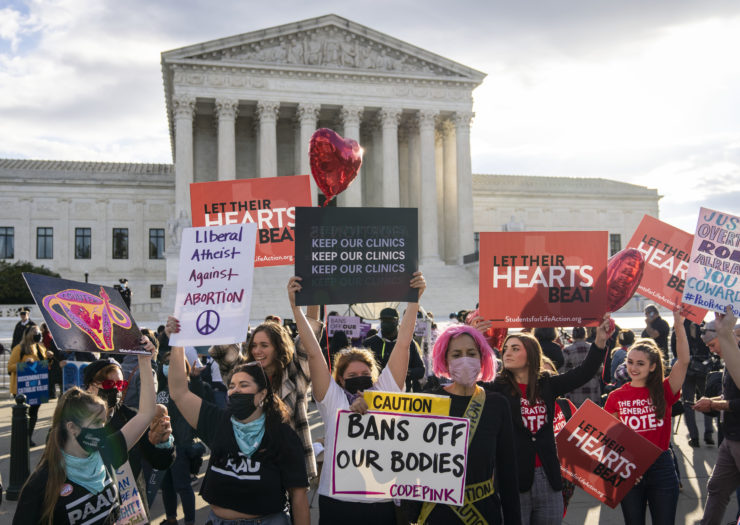
First Roe v. Wade Supreme Court showdown scheduled for this week
A case from Mississippi surrounds a law that would ban abortions in the state after 15 weeks. It was previously blocked from enforcement by lower courts.
On Wednesday, Dec. 1, the Supreme Court will take on the most significant showdown over abortion rights in at least three decades, a direct challenge out of Mississippi to Roe v. Wade’s landmark ruling that abortion is a constitutional right.
This is the case that pro-life advocates have long sought for and pro-abortion advocates have dreaded, coming before a strongly conservative lineup of justices.
"If Roe is reversed, almost half the states in America would strictly limit abortion and perhaps ban it altogether," said Nancy Northup, the president and chief executive of the Center for Reproductive Rights, which supports abortion rights.
In a historic move, the state of Mississippi has asked the US Supreme Court to overturn Roe v. Wade
— Live Action (@LiveAction) November 26, 2021
On Wednesday - the high court will hear arguments in the #DobbsvJackson case, which debates a pro-life law banning abortion after 15 weeks
Here's everything you need to know
RT! pic.twitter.com/sCH1Glfrpd
At the heart of the case is a Mississippi law — passed in 2018, but blocked by the lower courts — that would ban most abortions after 15 weeks of pregnancy, allowing them only in medical emergencies or cases of severe fetal abnormality.
The case presents an attack on the 1973 ruling of Roe v. Wade and a follow-up decision in Planned Parenthood v. Casey about two decades later.
The court held that a state can impose some restrictions on abortion as long as they don’t cause any “undue burdens,” but cannot ban the procedure before fetal viability, generally considered to be 23 to 24 weeks into the pregnancy.
In its submissions, Mississippi said the Supreme Court made a fundamental error in its landmark abortion rulings, arguing, “nothing in constitutional text, structure, history or tradition supports a right to abortion.”
The state also said the court was wrong to rule that state laws outlawing abortion violated a woman’s right to privacy.
“Nowhere else in the law does a right of privacy or a right to make personal decisions provide a right to destroy a human life,” it said in its brief to the court.
As an alternative, Mississippi said if the court chooses not to overrule Roe and Casey, it should at least say that banning abortion after 15 weeks does not unduly burden the right to the procedure, since most abortions are performed by that point. Mississippi’s only abortion provider does not offer the procedure after 16 weeks of pregnancy.
"[By] siding with Mississippi, the court is undoing 50 years of precedent. There's no way to get around that." Imani Gandy (@AngryBlackLady) on what to expect from the Mississippi abortion law challenging Roe v. Wade in the Supreme Court this week. pic.twitter.com/yWRkiEA1l8
— Yasmin Vossoughian Reports (@YasminMSNBC) November 28, 2021
The Center for Reproductive Rights, representing opponents of the law, said in its briefs that “because pregnancy so intensely impacts a woman’s bodily integrity, her liberty interests are categorically stronger than any state interest” until the point of viability.
RELATED CONTENT
Nearly one in four American women decide to terminate a pregnancy during their lives, and tens of thousands seek abortion after 15 weeks, the group said.
“Two generations, spanning almost five decades, have come to depend on the availability of abortion, and the right to make this decision has been further cemented as critical to gender equality,” it wrote.
The group also said the Supreme Court has been through all of this before, because it was repeatedly asked to overrule Roe and abandon the viability analysis. Any decision now to uphold Mississippi’s ban after 15 weeks “would signal that anything goes — or at least that any ban would have a chance of surviving in court," it said.
In its brief, the Biden administration leaned heavily on precedent.
“The passage of another three decades means that every American woman of reproductive age has grown up against the backdrop of the right secured by Roe and Casey, which has become even more deeply woven into the nation's social fabric,” it said.
In a Washington Post-ABC News poll conducted in early November, 60% of respondents said the Supreme Court should uphold Roe, while 27% said the court should overturn it.
The court is expected to issue its ruling by early July.










LEAVE A COMMENT: